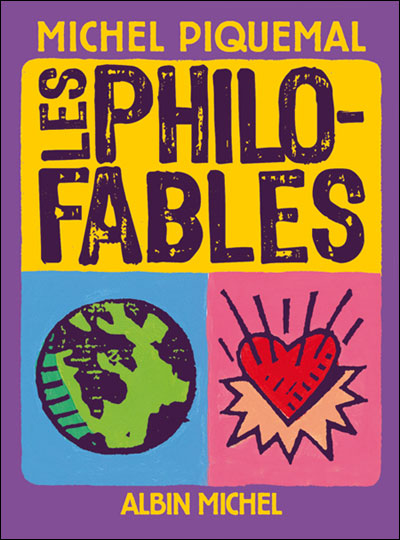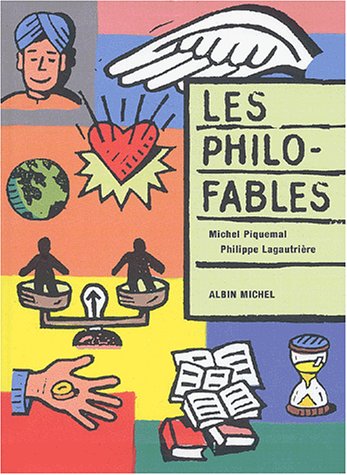Title of the work
Country of the First Edition
Country/countries of popularity
Original Language
First Edition Date
First Edition Details
Michel Piquemal, illustrations de Philippe Lagautrière, Les Philo-Fables. 60 Fables accompagnées de questions, de repères et de mots-clés (dès 9 ans). Paris: Éditions Albin Michel, 2003, 141 pp.
ISBN
Genre
Fables
Illustrated works
Instructional and educational works
Philosophical fiction
Target Audience
Children (Children from age 9)
Cover


Cover: Courtesy of Éditions Albin Michel, two examples of cover, the first one of 2003 and the second of one of the later reprints.
Author of the Entry:
Elżbieta Olechowska, University of Warsaw, elzbieta.olechowska@gmail.com
Peer-reviewer of the Entry:
Lisa Maurice, Bar-Ilan University, lisa.maurice@biu.ac.il

Portrait of Philippe Lagautrière: Courtesy of Renaud Monfourny; photograph taken Feb. 27, 2012, at an exhibition at Galérie Oblique à Paris; file available at Renaud Monfourny’s photoblog (accessed: May 28, 2018).
Philippe Lagautrière
, b. 1953
(Illustrator)
Philippe Lagautrière born on December 10, 1953, in Ivry-sur-Seine, is a French painter and illustrator who created pictures for Michel Piquemal’s Mon premier livre de sagèsse, Les Philo-Fables, Les philo-fables pour vivre ensemble et Les philo-fables pour la terre. His original painting style is marked by the use of rubber stamps mounted on wood.
For more information on Philippe Lagautrière see his monograph Inspiration, Paris: Éditions Critères/Paris-Musée, 2005; see his website (accessed: June 3, 2018).
Bio prepared by Elżbieta Olechowska, University of Warsaw, elzbieta.olechowska@gmail.com

Portrait (accessed: May 28, 2018): Michel Piquemal au 7e salon du livre de jeunesse à Cormontreuil, March 2012, photo by Garitan, licenced under Creative Commons Attribution-Share Alike 3.0, f
Michel Piquemal
, b. 1954
(Author)
Born on December 17, 1954 in Béziers (Hérault, France). He studied literature, comparative literature, and education; worked until 1988 as a primary school teacher. Authored over two hundred books for children and YA, writes texts for comic books, song lyrics, television scripts, articles in children’s periodicals. One of his favourite themes is philosophy, another… the American Indians. He produces an average of six books per year. He tried many different genres, including detective stories, theatre, heroic fantasy.
In 1989, he won the grand prize for a book for youth awarded by the French Ministry of Youth & Sports for his novel Le Jobard. He created a collection Carnets de sagesse published at Éditions Albin Michel to which he contributed himself several volumes.
La Chanson des Sirènes won the Prix Jeunesse Mousse du Salon du livre maritime in Concarneau in 1999 (see here, accessed: June 3, 2018).
Michel Piquemal’s Works Inspired by Antiquity – bolded titles refer to texts included in the survey.
Piquemal, Michel. Petite anthologie de la Mythologie. Toulouse: Éditions Sédrap, 1996. Collection Genres Littéraires au Collège.
Piquemal, Michel. La chanson des sirènes. Album pour les 7- 12 ans, illustré par Max Cabanes. Toulouse: Éditions Milan, 1998. Gd Prix salon livre Concarneau 1999.
Piquemal, Michel. Les Philo-Fables. 60 Fables accompagnées de questions, de repères et de mots-clés; dès 9 ans. Paris : Éditions Albin Michel, 2003.
Translation : Chinese, Spanish, Korean, Greek, Hebrew, Brasilian Portuguese, Italian, Serbian,Polish
Sound version: Montreal: Éditions Stanké, s.d.
Piquemal, Michel. Petites & grandes fables de Sophios. Paris: Éditions Albin Michel, 2004.
Translation: Chinese, German, Japanese, Italian Sound version: Montreal: Éditions Stanké, s.d.
Piquemal, Michel. Récits fabuleux de la mythologie: amours, ruses et jalousies, Paris: Éditions Albin Michel, 2006. Vol.1 .
Translations: Chinese, Italian
Sound version: Montreal: Éditions Stanké, s.d.
Piquemal, Michel. Récits fabuleux de la mythologie: les héros et les monstres [Fabulous Mythological Tales : Heroes and Monsters]. Paris: Éditions Albin Michel, octobre 2006. Vol. 2.
Translation : Chinese
Sound version: Paris: Éditions Albin Michel, s.d.
Piquemal, Michel. Les Philo-Fables, Paris: Livre de Poche, mai 2010.
Vol. 1-2 for adult reader.
Piquemal, Michel et Daniel Royo. Le secret de Marcus Caïus Victor, roman historique pour les 8/12 ans au coeur de la Gaule narbonnaise. Illustrations de Gwendal Lazzara. Toulouse: Éditions Sédrap, novembre 2011
Piquemal, Michel. Récits fabuleux de la mythologie. Illustrations by Séverin Millet. Paris: Éditions Albin Michel, 07.12.2012.
Sources:
Michel Piquemal’s official website (accessed: June 3, 2018).
Full bibliography of books by Michel Piquemal is posted here (accessed: June 3, 2018).
Bio prepared by Elżbieta Olechowska, University of Warsaw, elzbieta.olechowska@gmail.com
Translation
Translated into: Brazilian Portuguese, Chinese, Greek, Hebrew, Italian, Korean, Polish, Serbian, Spanish.
Sound edition: published in Montreal by Éditions Stanké, s.d.
Summary
A collection of fables and tales from European philosophy, mythology, Eastern wisdom, popular tradition of many countries. All stories are similarly structured. Each fable is followed by an indication of source and then by a modern explanation of the moral entitled In the Philosopher’s Workshop (Dans l’atelier du philosophe). The key-words for each story are placed on the upper margin. Words considered difficult for the child reader are explained in footnotes, e. g. *Parabole: petit récit sous lequel se cache un enseignement et parfois même une morale.
More on tales connected to classical antiquity:
Socrates told his students to weigh up what they want to say according to three principles: is it true, is it good, is it useful. If what we want to say is none of the three, we should simply forget it.
Three anecdotes about Diogenes, with the following morals:
Independence & freedom are more important than great wealth.
Simple pleasures of life are more desirable to the wise than riches.
To live without possessions is to be free.
Pliny the Younger tells the story of a former slave who made a great success of his small farm and was accused by envious neighbours of using magic. He brought his oxen and his farming tools to the court and said that this was the only magic he could show because he could not bring his sweat and effort invested in great quantities in his farm. The court acquitted him unanimously.
Aesop’s fable about travellers criticizing a shade-giving tree as useless even though, they were able to rest in its shade, warns us not to judge an issue before we fully understand it.
Horace tells the story about the blade hanging over Damocles’ head: how strong must be our desire for power if we’re ready to live under constant threat of death.
Ovid in his Metamorphoses talks about King Midas trying to hide his donkey’s ears given him as a punishment by Apollo but the truth always comes out. Ovid also relates the story of Narcissus who fell in love with his own reflection: love of oneself is necessary but if it becomes excessive, one may go mad.
Sophocles’ tragedy Antigone tells us about the conflict between human and divine laws and reflects on the dilemma which one should we observe and when.
Plato’s story of the ring of Gyges making the wearer invisible brings up the question, would we do good or bad, if we were not afraid of punishment for our actions?
Analysis
Mythological stories and ancient anecdotes are collected here along with similar fables and tales from other regions, providing a useful and light introduction to the philosophy of various cultures. The classical stories concern several Greek philosophers about whom the nine-year-old readers meet probably for the first time, such as Socrates, Diogenes, and Plato. They are presented in the context of well known anecdotal episodes in their lives which encourages further interest in their characters, their times, and their achievements. Children see these figures as characters living memorable adventures increasing their awareness of the remote. Antiquity, as fascinating and not entirely dissimilar from their own time. The other stories taken from Graeco-Roman culture present situations with a moral conclusion, most of them borrowed from well-known myths and described by Greek and Roman writers, poets and prose writers. Philo-Fables by offering also information about sources constitute a well designed, attractive and informative “first contact” with classical culture within the context of
other world cultures.
Further Reading
Mekouar, Myriam, «Quand la littérature ne prend pas l’enfant pour une bille ! – interview avec Michel Piquemal», "La Pause Philo," 9 July 2020 (accessed October 26, 2020).
Nières-Chevrel, Isabelle, Introduction à la littérature de jeunesse, Paris: Didier Jeunesse, 2009.
Prince, Nathalie and Sylvie Servoise, Les personnages mythique dans la littérature de jeunesse, Rennes: Presses Universitaires de Rennes, 2015.
Addenda
The Author’s Official Site: Michelpiquemal.com (accessed: November 22, 2022).


